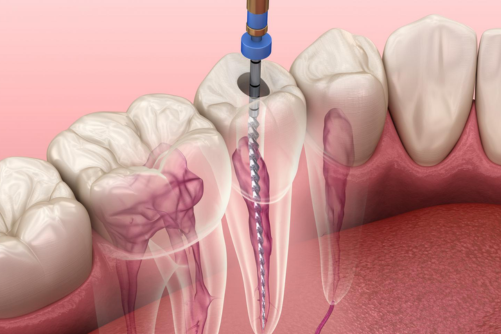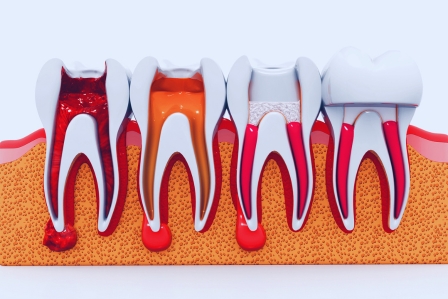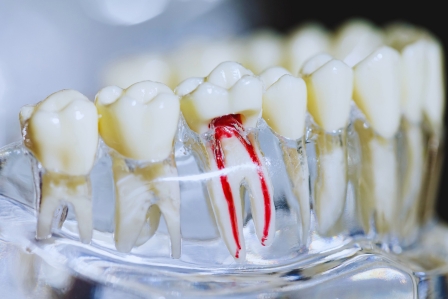
Severe tooth decay can be alarming, often causing pain and making it hard to eat or smile comfortably. But losing the tooth may not always be necessary.
In many cases, a root canal can save it. This standard dental treatment helps preserve your natural tooth while relieving discomfort.
Let’s explore how a root canal saves a severely decayed tooth.
What Happens When a Tooth Is Severely Decayed?
Tooth decay develops when harmful bacteria erode the enamel. If untreated, the decay can reach the inner layers of the tooth, including:
- The dentin: The layer beneath the enamel is more sensitive and prone to damage.
- The pulp: The soft tissue inside the tooth containing nerves and blood vessels.
Once the pulp is affected, infection and pain are likely to occur. Signs of severe decay may include:
- Persistent toothache or sensitivity
- Swelling around the gums
- Discoloration of the affected tooth
The infection can spread if left untreated, potentially causing more significant health issues.
How Does a Root Canal Work?
A root canal in Wichita, KS, focuses on treating infection inside the tooth without removing it. The procedure involves:
- Removing the infected pulp
The dentist cleans out the decayed tissue, eliminating bacteria. - Cleaning and disinfecting the area
Specialized tools ensure the inner chambers are thoroughly cleaned. - Filling and sealing the tooth
A biocompatible material fills the space to prevent further infection. - Restoring the tooth
A crown or filling is placed on top to strengthen the tooth and restore its function.
This step-by-step approach stops the infection and allows you to keep your natural tooth.
Why Choose a Root Canal Over Tooth Extraction?
While extraction might seem more straightforward, saving a natural tooth is often better. Here’s why:
- Maintaining your smile: Keeping your tooth avoids gaps affecting your confidence.
- Preserves jaw health: Missing teeth can lead to bone loss over time.
- Supports normal chewing: Natural teeth provide better functionality than artificial replacements.
Replacing a missing tooth with options like implants or bridges is often more expensive and time-consuming.
When Is a Root Canal Necessary?
Dentists recommend a root canal if the decay or infection is too severe for a simple filling. Situations that may require this treatment include:
- Deep cavities that reach the pulp
- Cracked or chipped teeth exposing inner layers
- Abscess formation causing swelling and discomfort
Your dentist will evaluate your tooth with X-rays and a physical exam to decide the best treatment.
Does the Procedure Hurt?
One of the biggest concerns people have about root canals is pain. However, advancements in dental technology make the procedure relatively comfortable. Dentists use local anesthesia to numb the area, ensuring minimal discomfort.
Most patients compare the sensation to getting a regular filling. Some sensitivity may occur after the procedure, but this is temporary and manageable with over-the-counter pain relief.
What are the Benefits of a Root Canal for Decayed Tooth?
Choosing a root canal for a severely decayed tooth offers several benefits, including:
- Relief from pain: The treatment eliminates the source of discomfort.
- Long-lasting results: The restored tooth can last a lifetime with proper care.
- Improved oral health: Removing infection prevents further complications.
These advantages make it a reliable and practical solution for dental issues.
How Can You Maintain the Restored Tooth After a Root Canal?
Post-treatment care is essential to ensure the success of the procedure. Follow these tips to maintain your restored tooth:
- Practice good oral hygiene: Brush and floss daily to keep bacteria at bay.
- Visit your dentist regularly: Routine checkups help monitor your oral health.
- Avoid hard foods initially: This prevents unnecessary stress on the tooth.
Your dentist may recommend a crown for added strength, especially for back teeth that endure more pressure during chewing.
How to Prevent Tooth Decay in the Future?
Prevention is the best way to avoid the need for invasive treatments like root canals. Simple habits can go a long way, such as:
- Brushing your teeth twice daily with fluoride toothpaste
- Flossing to remove plaque between teeth
- Reducing sugary snacks and drinks
- Scheduling regular dental cleanings and checkups
These steps protect your teeth and contribute to better overall health.
A root canal saves a severely decayed tooth. This treatment not only eliminates infection but also preserves your natural smile. By acting promptly and following preventive measures, you can maintain strong, healthy teeth for years.



